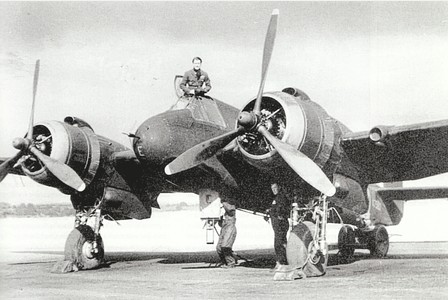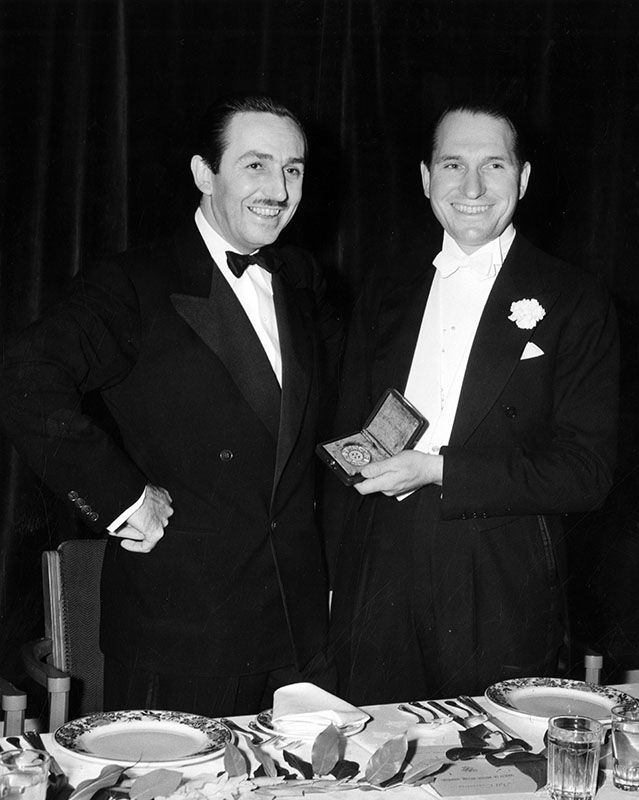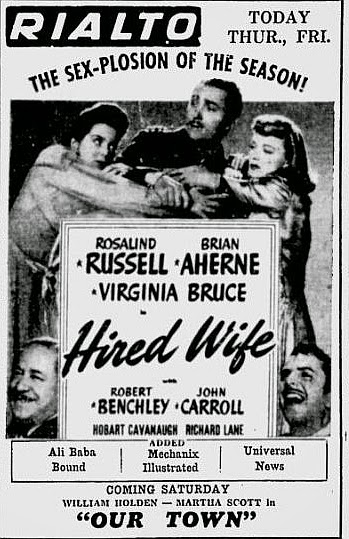Saturday 28 June 1941
 |
| A Soviet 32nd Division T-34 tank destroyed near Suhovolja west of Lviv, Ukraine, 28 or 29 June 1941. |
In the Army Group North sector, the Wehrmacht advances across the Dvina River on a railway bridge at Riga. The Red Army is in full retreat and the Dvina River line essentially lost already. Soviet Marshal Timoshenko virtually takes over the Northwestern Front from General Kuznetsov (who technically remains in command) and orders a stand on the Velikaya River. Soviet 21st Mechanized Corps unsuccessfully attacks the German 4th Panzer Group at the Daugavpils bridgehead.
Far behind the front, the fortress of Brest still holds out at Brest-Litovsk. The German 45th Infantry Division (Generalmajor Fritz Schlieper) makes slow progress, but the defenders are resisting every step and the Germans have lost literally hundreds of men. The German infantry units assigned to the task of reducing the east fort and citadel, the only points still in the hands of the Soviets, use captured Soviet and French tanks to blast the defenders. Included among the Soviets is at least one commissar, Yefirm Fomin, would be shot on sight, and about 300 families of Soviet servicemen. Rather than continue pressing forward solely using costly ground attacks or sit through an extended siege, the Wehrmacht finally calls for the Luftwaffe to prepare to soften up the trapped Soviet soldiers on the 29th. The fortress is important because it stands along the main German supply line on the road to Moscow.
 |
| A Soviet T-28 with extra armor abandoned after mechanical issues. Ukraine. Summer of 1941. Tanks breaking down is a major problem for the Red Army during this period of time. |
A mass panic develops among Soviet troops and civilians alike as they flee eastward in the direction of Moscow. The OKH (German Army headquarters) and Army Group Center commander General Fedor von Bock are unanimously in agreement that the panzers need to head toward the Soviet capital at full speed. However, at his new Wolfschanze headquarters in Rastenburg, East Prussia, Adolf Hitler is getting nervous about the panzers outrunning the infantry. As at Dunkirk a year earlier, Hitler considers halting the panzers so the infantry can catch up.
 |
| Soviet General Pavlov. |
In the Army Group South sector, the Battle of Brody continues. It is not going well for the Soviets, who are losing tanks in a series of disjointed attacks. The Germans are most alarmed at an advance by General Nikolai Popel's powerful force of 300 tanks which has cut 11th Panzer Division's lines of communications at Dubno. The Germans quickly reshuffle their forces and attack Popel with elements of the 16th Motorized, 75th Infantry Division, two other infantry divisions, and General Hans-Valentin Hube's 16th Panzer Division. The Wehrmacht quickly surrounds Dubno, stopping Popel's advance and forcing him onto the defensive.
 |
| A photo of demolished buildings in Tauroggen, Lithuania that was taken on 28 June 1941. (Dumm, Federal Archives, Bild 146-1974-171-14). |
Elsewhere, German forces take Rivne. The Germans intend to make Rivne the administrative center of Reichskommissariat Ukraine. However, first, Rivne must be "cleansed" to German standards. Half of Rivne's population is Jewish and the SS Einsatzgruppen move into the town quickly to begin liquidations.
A major problem for the Soviets is that their tanks are breaking down in large numbers. Their formidable numerical superiority over the Germans masks the fact that the roads are littered with broken-down tanks, including the most advanced models.
 |
| A photo that was taken on 28 June 1941 somewhere in the Soviet Union. "Two Bolshevik soldiers, disguised as peaceful civilians, were tracked down in a cornfield. These snipers and saboteurs will be ruthlessly [dealt with]." (Leßmann, Federal Archives Bild 146-1989-038-36). |
Further west, the Vichy French and Australians battle over mountain peaks east of Beirut. The Australian 2/3 Battalion is dislodged from the top of Jebel Mazar, a key position because it controls the road from British-occupied Damascus and French-occupied Beirut. Elsewhere, though, the Australians occupy other peaks abandoned by the French (and Senegalese).
In the air, the battle the Vichy French and RAAF continues with great ferocity. The Australian P-40 Tomahawks claim six victories over the French. Flight Officer Lt. A.C. Rawlinson files three claims.
Off the coast, Australian light cruiser Perth and accompanying destroyers bombard Damur during the afternoon.
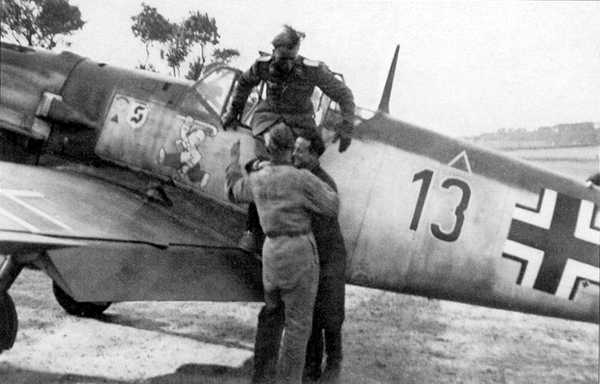 |
| Mickey Sprick with his JG 26 (note the Schlageter logo) BF 109. |
Luftwaffe ace Oblt. Gustav “Mickey” Sprick, Staffelkapitän of 8./JG 26, perishes in an accident when his wing sheers off during a turn over St. Omer. He has 31 victories.
Battle of the Baltic: Soviet submarine M-99 of the Baltic Fleet hits a mine off Hiiumaa Island and sinks.
A German motor torpedo boat torpedo and sinks Soviet submarine S-10 in Danzig Bay.
The Soviets scuttle destroyer Lenin at Libau (Liepāja), Latvia.
Finnish ship Vetehinen lays mines off the Estonian coast.
U-146 goes on a second patrol from 26 July - 11 August 1941, but scores no more victories. After that, it remains in Wilhelmshaven as a training boat in the 22nd U-boat Flotilla. It is scuttled on 2 May 1945 and later scrapped.
Italian submarine Da Vinci torpedoes and sinks 8030-ton British tanker Auris several hundred miles off Casablanca. There are 32 deaths and 27 survivors, picked up by HMS Farndale.
Royal Navy destroyer HMS Tatar intercepts and sinks German weather ship Lauenburg with gunfire off Jan Mayen.
The Luftwaffe bombs and sinks 4972-ton British freighter Barrhill north of Great Yarmouth. There are five deaths and 35 survivors.
US destroyer USS Madison runs aground at the southeast tip of Moratties Shoal, Placentia Harbor, Argentia, Newfoundland. It sustains some damage but remains in service, heading as scheduled for Boston on the 29th.
Royal Navy light cruiser HMS Euryalus is commissioned, escort carrier Chaser is laid down.
The US Navy lays down submarines USS Wahoo and Whale, both at Mare Island Navy Yard, Vallejo, California.
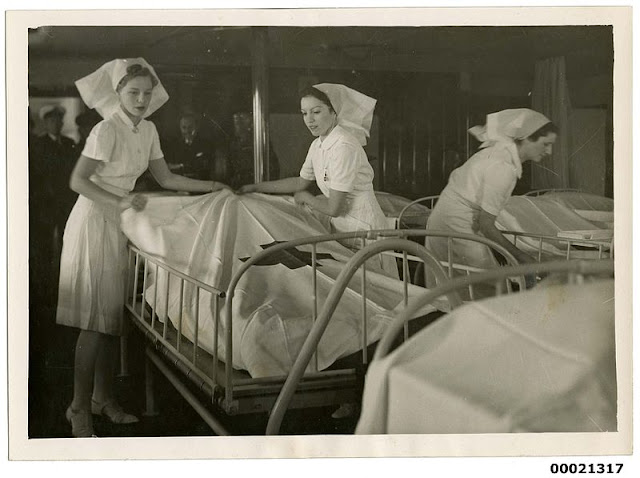 |
| Nurses aboard TSS Oranje II. This is a hospital ship that is handed over by the Dutch Netherlands Indies Government on 28 June 1941 to Australia and New Zealand for use as a hospital ship (Sam Hood, Australian National Maritime Museum No. 00021317). |
Force H at Gibraltar executes a quick turnaround at Gibraltar after completing Operation Railway 1. It quickly departs on Operation Railway 2, another supply mission to Malta. Aircraft carrier HMS Furious carries 8 Hurricanes and Ark Royal carries 26 Hurricanes. Following standard practice, the ships first head west from Gibraltar to throw off any shore-based spies.
Italian light cruisers Attendolo and Duca D'Aosta lay mines in the Sicilian Channel.
On Malta, the RAF forms new fighter squadron No. 126 at Ta Qali. Its commander is Wing Commander Alexander C Rabagliati.
 |
| A photo that was taken on 28 June 1941 in Prienai, Lithuania. Original title in German: "Where Germans are - the Jew has to work. As in Poland, as now in Lithuania. And there is so much to do on the streets alone...." (Trautvetter, Federal Archives, Bild 146-1974-170-23). |
Spy Stuff: During the Royal Navy encounter with German weather ship Lauenburg north of Iceland, the British of HMS Tartar board the ship. They find codes and equipment useful for cracking German codes, then Tartar sinks the ship.
Propaganda: Well-known British author P.G. Wodehouse ("My Man Jeeves") begins the first of five broadcasts from Berlin entitled "How to be an Internee Without Previous Training." They are not political except in the broadest sense and include humorous anecdotes and personal experiences. Wodehouse tells how he was trapped at Le Touquet during the Battle of France, then taken to prisons at Loos (Lille) and then Tost, Upper Silesia before being allowed to return home to Le Touquet. The Gestapo recently has forced Wodehouse to move to the expensive Hotel Adlon in Berlin - at his own expense - through a mixture of coercion and persuasion (they allow him access to his frozen assets in exchange for cooperation). All the British public knows, though, is that he is living in "luxury" while helping the Germans.
The broadcasts over CBS are aimed at the United States but recorded for later rebroadcast to England in August. The original broadcasts continue on 9, 23 and 30 July, and 6 August 1941. They lead to hostility toward Wodehouse throughout Britain (but not in the United States, partly due to the fact that he is not as well known there). The broadcasts also create enduring post-war problems for Wodehouse with the British authorities, though no charges are ever brought against him.
Special Ops: The Italians cancel the mission of Italian submarine Scirè to launch midget submarines against Grand Harbour, Malta.
 |
| Vannevar Bush and Arthur Compton, 1940. |
German/Soviet Relations: German Foreign Minister Joachim Ribbentrop sends a diplomatic request to the Berlin Japanese Embassy. It requests that Japan join Operation Barbarossa from the east. The suggested target for the Japanese attack is Vladivostok, which the Soviets can use at this time as a port of supply from the United States. This would violate the recent Japanese/Soviet Neutrality Pact.
At some point during this week - details are very sketchy - Soviet Premier Joseph Stalin attempts to broker a peace deal with Hitler through a Bulgarian diplomat, Ivan Stamenov. Foreign Minister Molotov has Lavrentiy Beria arrange this by using one of Beria's subordinates, NKVD officer Pavel Sudoplatov, who has a "casual" lunch at a Moscow restaurant with the diplomat. Sudoplatov explains to Stamenov what to say to Hitler. Stalin is willing to offer huge concessions for peace, including Ukraine and all of the areas granted to him in the "secret protocol" to the 23 August 1939 Molotov/Ribbentrop Pact in the Baltic States. Stalin does, though, demand to know why Hitler invaded the USSR.
Hitler turns Stalin down flat and will not even consider the offer. This is one of Hitler's biggest mistakes. These revelations were hidden for many years but came to light during the period after Stalin died from natural causes in the 1950s. There are few other details of this little-known incident, but there is no reason to doubt that it happened. This peace offer was classified as treason and was one of the charges used to condemn Beria to death. The others involved - including the Bulgarian Stamenov diplomat used as the go-between - submitted affidavits confirming the incident. Sudoplatov confessed to it under interrogation and also was convicted of treason, serving 15 full years in prison (yes, there are many questions about the validity of such "proof," but there was a lot of corroboration). Molotov was never tried for treason despite his deep role in the incident, but gradually fell out of favor, lost his positions one by one, and by 1962 was a "non-person" in the Soviet bureaucracy.
Finnish Military: While Finland is at war with Germany, very little fighting has occurred to date. Today, the Finnish General Staff finalizes plans for an offensive into Ladoga Karelia. It is planned for 10 July. In the Salla/Kandalasksha region, Finnish troops prepare for an offensive against the Murmansk railway in conjunction with German forces. At this time, the Finns are ready to invade the historically Soviet territory near Finland and not just recover Finnish territory recently lost during the Winter War.
Spanish Military: General Agustin Munoz Grandes is appointed to command the new volunteer Blue Division. It is being formed to support Operation Barbarossa in the Soviet Union.
 |
| A restored 1941 Plymouth P12 Special Deluxe 4 Door Sedan Staff Car. |
British Government: Oliver Lyttelton becomes British minister in the Middle East.
US Government: The US Senate confirms Harlan F. Stone to be the new Chief Justice of the Supreme Court of the United States.
Soviet Government: The Soviet NKVD, NKGB, and the Chief Prosecutor Office sign a secret order regarding the investigation of subversives. This will be used quickly to liquidate many Ukrainian nationalists.
Philippines: Admiral Thomas C. Hart transfers his headquarters ashore from USS Houston.
 |
| A victim of the Jassy pogrom (the United States Memorial Holocaust Museum). |
In newly captured Minsk, the Gestapo quickly immediately all men 15-45 years of age to register at a central collection point. The Germans immediately apprehend the registrants and march them to the Drozdy concentration camp.
The Soviet NKVD begins killing an unknown number of Ukrainian nationalists in Lviv. Those not liquidated are transported to the east.
The Croatian Ustaše are committing so many atrocities against Serbs that the German representative there signals the OKW that it may cause problems.
A pogrom begins in Jassy (Iassy, Iasi, Yassy), Romania.
 |
| A 1941 Ford Super Deluxe two-door convertible. |
Colonel Bill "Wild Bill" Donovan, founder of the OSS/CIA, makes a speech broadcast over the CBS radio network. Framing the war as a religious crusade, he concludes:
We must reassert our belief in a Christian democracy—a democracy whose chief concern is not for human life but for human liberty; not for peace but for the dignity of man in the image of his Master.He also states that "we must assume that Germany will defeat Russia," which is a common view at this time.
Future History: David Johnston is born in Greater Sudbury, Ontario, Canada. He later becomes the 28th Governor General of Canada from 2010-2017.
Alphonso Downing is born in Trenton, New Jersey. He becomes a Major League Baseball player for the New York Yankees on 19 July 1961 and plays on various teams until 13 July 1977. Al Downing is most famous for giving up Hank Aaron's 715th home run (one more than Babe Ruth) as a member of the Los Angeles Dodgers on 8 April 1974. After retiring, Downing becomes a Dodgers broadcaster and still attends Yankees Old-Timers Day festivities.
 |
| Three (of twelve) contestants for the title of "America's Dairy Queen" for 1942, a contest held in Chenango County, New York. Barbara Tingley, right, wins. |
June 1, 1941: Farhud Pogrom
June 2, 1941: Massacres on Crete
June 3, 1941: Kandanos Massacre
June 4, 1941: Kaiser Wilhelm Passes Away
June 5, 1941: Death in Chungking
June 6, 1941: Hitler's Commissar Order
June 7, 1941: Commandos Strike at Pessac
June 8, 1941: British Invade Syria and Lebanon
June 9, 1941: Litani River Battle
June 10, 1941: British Take Assab
June 11, 1941: Hitler Thinking Beyond Russia
June 12, 1941: St. James Agreement
June 13, 1941: Lützow Damaged
June 14, 1941: Latvian June Deportations
June 15, 1941: Operation Battleaxe
June 16, 1941: The Old Lion
June 17, 1941: British Spanked in North Africa
June 18, 1941: Turkey Turns Its Back
June 19, 1941: Cheerios Introduced
June 20, 1941: Birth of US Army Air Force
June 21, 1941: Damascus Falls
June 22, 1941: Germany Invades Russia
June 23, 1941: A Soviet KV Tank Causes Havoc
June 24, 1941: Kaunas and Vilnius Fall
June 25, 1941: Finland Declares War
June 26, 1941: Bombing of Kassa
June 27, 1941: Encirclement At Minsk
June 28, 1941: Minsk Falls
June 29, 1941: Brest Fortress Falls
June 30, 1941: Mölders Becomes Top Ace
2020

